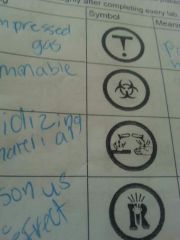![]()
![]()
![]()
Use LEFT and RIGHT arrow keys to navigate between flashcards;
Use UP and DOWN arrow keys to flip the card;
H to show hint;
A reads text to speech;
16 Cards in this Set
- Front
- Back
|
what is a purpose |
A statement of the main focus of the experiment. sometimes called the problem |
|
|
what is a problem |
The major question the experiment is designed to answer |
|
|
What is a hypothesis |
A prediction of the answer to the problem based on prior knowledge. the hypothesis is thought of before the experiment is carried out |
|
|
what is a conclusion |
The answer to the problem or purpose based on the results of the experiment. a statement about whether the hypothesis was correct or not is included |
|

what are these symbols |
compressed gas flammable oxidzing material posinous-toxic
|
|

what are these symbols |
Poisonous biohazardous corrosive dangerously reactive |
|
|
what is the scientific method |
The method used by scientists to answer questions about the natural world |
|
|
how many Sig digs does 0.093790 have |
5 |
|
|
Sig digs with addition and subtraction |
The final answer is rounded off to the same number of decimal places as the measurement with the fewest |
|
|
Sig digs with multiplication and division |
The answer is rounded off to the same number of sig figs is a measurement with the fewest. |
|
|
Quantitive |
numerical |
|
|
Qualitative |
is descriptive |
|
|
what are characteristics of a scientific question |
The question that is answerable by the scientific method/cycle of Proof |
|
|
Define observation |
Statement of sings detected using our senses |
|
|
Define scientific theory and scientific law |
A scientific law describes a phenomenon in nature a scientific theory explains why the phenomenon occurs |
|
|
what is a Dependant variable |
The variable for which the experiment measures the response |

